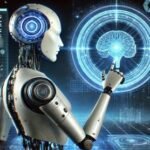Artificial Intelligence (AI) is rapidly reshaping the healthcare landscape, bringing unprecedented changes to how patient care and diagnostics are delivered. From early disease detection to personalized treatment plans, AI is empowering healthcare providers to offer faster, more accurate, and more efficient care.
This technological revolution is not just a future possibility, it’s happening now. Let’s explore how AI is transforming patient care and diagnostics in healthcare.
1. Early and Accurate Disease Diagnosis
One of the most significant contributions of AI in healthcare is enhancing the accuracy and speed of diagnoses. AI-powered systems can analyze medical images, pathology reports, and patient data to detect diseases like cancer, heart conditions, and neurological disorders much earlier than traditional methods.
Examples:
- AI algorithms in radiology can identify tumors in X-rays, CT scans, and MRIs with remarkable precision.
- AI tools for diabetic retinopathy detection are helping eye specialists diagnose vision issues early, even in remote areas.
By supporting doctors with advanced diagnostic insights, AI reduces human error and leads to better patient outcomes.
2. Personalized Treatment Plans
AI enables the creation of personalized treatment plans tailored to an individual’s unique genetic makeup, lifestyle, and medical history. Machine learning models analyze vast amounts of patient data to recommend treatments that are more likely to succeed for a particular patient.
Benefits:
- Improved treatment effectiveness
- Fewer adverse reactions
- Enhanced patient satisfaction
Precision medicine, powered by AI, is becoming a new standard in managing chronic diseases like cancer, diabetes, and heart disease.
3. Virtual Health Assistants & Chatbots
AI-driven virtual health assistants are revolutionizing how patients access healthcare information and support. These chatbots can:
- Answer medical queries 24/7
- Help schedule appointments
- Remind patients to take medications
- Provide mental health support
By handling routine interactions, AI chatbots free up valuable time for healthcare professionals to focus on critical cases.
4. Predictive Analytics for Preventive Care
AI’s predictive capabilities are enabling proactive and preventive care. By analyzing patient data, AI can identify patterns and predict potential health issues before they become serious.
Use Cases:
- Predicting hospital readmissions
- Forecasting disease outbreaks
- Identifying patients at high risk of chronic illnesses
This shift towards preventive care helps reduce hospital visits, lowers treatment costs, and improves overall public health.
5. AI in Remote Patient Monitoring
Wearable devices and IoT sensors collect real-time health data, which AI systems analyze to monitor patients remotely. This is especially beneficial for:
- Elderly patients
- Individuals with chronic conditions
- Post-surgery recovery monitoring
AI alerts healthcare providers to any abnormal readings, ensuring timely intervention and reducing emergency situations.
6. Enhancing Drug Discovery and Development
The traditional drug discovery process is time-consuming and expensive. AI accelerates this process by:
- Predicting how molecules will behave
- Identifying potential drug candidates faster
- Reducing the time taken for clinical trials through advanced simulations
This not only speeds up the development of new medicines but also makes them more affordable and accessible.
7. Administrative Efficiency & Cost Reduction
AI automates administrative tasks like:
- Medical coding and billing
- Managing patient records
- Insurance claims processing
By streamlining these back-office functions, healthcare institutions can reduce operational costs and focus more resources on patient care.
Conclusion
AI is not replacing healthcare professionals but empowering them to provide better care with greater precision and efficiency. From early diagnosis to personalized treatments and remote monitoring, AI is transforming every aspect of patient care and diagnostics.
As AI technology continues to evolve, its impact on healthcare will grow, making healthcare services more accessible, affordable, and effective for all.
The future of healthcare is intelligent, and AI is at the heart of this transformation.





